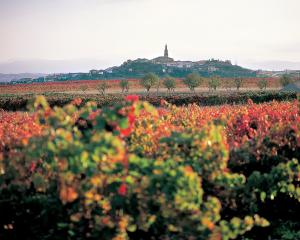There's a touching scene on the seafront of Martigues, on the Provencal coast of southern France.
A little girl, probably 6 or 7, sits eating a large bowl of mussels.
She holds an empty bivalve mussel shell in her hand, using it as tweezers, or pincers, to grab the meat dexterously out of other mussel shells, popping the meat into her mouth.
She's done this before.
The mussels are done in a white wine and garlic sauce.
The aroma, wafting about in the evening sea breeze of Mediterranean midsummer, is moving.
Next to her, mama has her own bowl, as does little sister, on the other side of mama.
Little sister needs help.
Mama's friend is there with her own daughter, and papa turns up after work for his share, too.
After the mussels, they're on to the sardines.
Welcome to summer in southern France.
Welcome to the sardine festivals of the Provencal seaports, just west of Marseille.
It's a truism that the best bits of travel are the unexpected discoveries.
Just as are the smaller experiences.
Sardines are small experiences whose impact is much bigger than their size.
We all know sardines as those tiny, odorous fish that come, drowning in oil, in cans that, when we were kids, we opened with keys that rolled back the lids.
Things are different in Europe.
Sardines are much bigger, although still below the limits in New Zealand under which most fish would be thrown back.
In France, sardines are venerated in the sardine festivals, in which the sardines - and the mussels - play key roles, by being eaten.
Sardines and mussels are staple seafoods around the ports of Martigues, Port du Bouc and Fos-sur-Mer, clustered around the Rhon River delta on the Camargue coast at the bottom of Provence.
The festivals run each year over the prime tourist season from the end of June until the end of August.
They cater mainly to locals and visitors from other parts of France, punctuated sparsely by a smattering of foreign tourists who find out about the festivals only by chance.
Each night, when you roll up to a festival campus, you get to gorge yourself on sardines, mussels, local wine and, in some festivals, on many other foods, too.
Both Port de Bouc and Martigues open each night at six.
In Port de Bouc, the festival has grown in 21 years to a dockside food court, with about a dozen local food operators competing with everything from sardines, through calamari, whitebait, even pizza and Asian food.
The stalls form a perimeter on the quay by the marina.
Inside, tables and chairs fill the void.
A bar sits on one side in the middle.
Coloured lights flash, music plays, and locals party into the night.
A small carnival caters to the kiddies.
"Ours is a better festival, because it's bigger and we have singing and dancing," says a stallholder, a mussels man.
Some might criticise Port de Bouc's Sardine Festival, that it has lost its focus, evolving more into a summer party than a sardine showcase.
Calling it a Sardines Festival is stretching it a bit.
Over in Martigues, a few kilometres to the east - you can see Martigues from dockside at Port de Bouc - the original of the sardine festivals has stayed smaller and more focused.
Les Sardinades de Regale de l'Ete - the Royal Sardines of Summer - has a community and family atmosphere.
It's a smaller enclosure on the waterfront, probably 30m long and the same wide, by the petanque rinks: the bouledrome.
One side opens to the waterfront, one is the kitchen and servery, the other two are fenced in to provide some definition to the festival.
The evening sea breeze and the clear, baby blue sky of Europe, seen through a summer's haze that softens the light, provide a romantic backdrop to the organoleptic sensations of the seafood.
They are local fishing families doing the cooking and serving in Martigues, backed by the town council, with mums, dads, siblings, and friends pitching in to sell, cook, serve and clean up.
Less commercial than Port de Bouc; fresher and more intimate.
The focus is on sardines - sardines barbecued whole; sardines filleted, butterflied, dusted in flour and fried; sardines Provencale (cold, in a tomato-based sauce); and steaming bowls of mussels in white wine, eschallots and garlic.
The style is redolent of tapas, the Spanish tradition of small, savoury dishes eaten together as a feast, which is understandable given the shared influences of Spain with southern France.
Martigues is better value than Port de Bouc.
For 23 ($NZ50) we get a bowl of mussels, two plates of barbecued sardines and two plates of butterflied sardines, with bread and a beaker of local wine thrown in for each dish.
The hubbub of family chatter fills the air.
Locals turn up, eat at the communal trestle tables, and leave, as in rostered waves.
We watch a family of three generations move from table to table, as space opens up and allows them to share the same table.
They have eight bowls of mussels and as many plates of sardines.
The men and kids carry the mussels and the sardines and the bread and the wine.
With so many bowls of mussels, the cook lays them out together, then ladles the mussels into them as into one large bowl.
The sauce laps over the edge.
The mussels steam and their aroma, with the sardines, generates a unique signature in one's sense of Martigues. - Paul Ellercamp and Suanne Hunt












